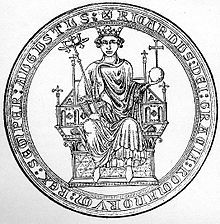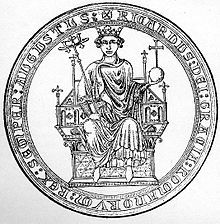Second son of John Lackland, King of England, and Isabel de Taillefer of Angouleme, born at Winchester Castle. Grandson of Henry II the King of England and Eleanor of Aquitaine, the House of Plantagenet. Only Geoffrey de Plantagenet actually used that term for his name as he wore a sprig of broom in his hat.
Husband of Isabel Marshall, daughter of Sir William Marshall and Isabel FitzGilbert, widow of Gilbert de Clare, the Earl of Gloucester. The marriage of his son to a wealthy, powerful family who repeatedly opposed him greatly displeasured King John. Richard became step-father to her six children by Gilbert, and they had four children:
* John of Cornwall, died as an infant
* Isabel of Cornwall buried with her brother, John
* Henry of Cornwall, m Constance de Bearn
* Nicholas of Cornwall, died as an infant
Secondly, Richard married Sanchia of Provence, daughter of Raymond de Berenger, on 23 Nov 1243 at Westminster Abbey. They had two sons:
* Unknown son born and died the same day
* Sir Edmund of Cornwall
Thirdly, Richard married Beatrice de Falkenberg, the daughter of Deitrich II de Falkenbrg. They had no children.
Richard also had several children by an unknown mistress:
* Philip of Cornwall, priest
* Sir Richard of Cornwall m Joan FitzAlan
* Sir Walter of Cornwall
* Joan of Cornwall m Richard de Champernoun & Sir Peter de Fissacre
1227 - Made High Sheriff of Berkshire, aged 8
1225 Feb 02 - knighted by his brother, King Henry III
1225 - granted the honour of Launceston, Cornwall, made him one of the wealthiest men in Europe
1229 - granted to honour of Berkhampstead
1231 - married Isabel Marshall, his main residence became Wallingford Castle in Berkshire
1232-3 - fought in Wales against Llywellyn ap Iowerth
1237 - openly spoke against his brother's greed and mis-administration, Henry bought his silence with more gifts
1237 - ambassador to Emperor Frederick
1233 - drove Llywelyn back, fortified Radnor Castle
1238 - Richard's sister, Eleanor, married Simon de Montfort
1240 - Isabel died, buried at Beaulieu Abbey
1240 - left to crusade for the Holy Lands
1241 - negotiated treaty with the Sultan of Krak, releasing many French from captivity
1243 - married Sanchia of Provence, the sister of his brother's wife
1243 - denounced all his rights in Ireland and Gascony, abandoning the title of Count of Ponthieu
1244 - granted the honour of Bradninch, Devon
1250 - Joint Ambassador to France and to Pope Innocent IV
1257 - elected King of the Romans, styled King of Almain, Jan 13rd, crowned at Aachen Jan 1259
1259 - failed to establish authority in Germany and returned to England
1261 - wife Sanchia died
1263 - achieved a temporary truce between the barons and his brother
1264 - taken prisoner at the Battle of Lewes May 14
1265 - released and lands restored after the Battle of Evesham Aug 04
1269 - married Beatrice de Falkenburg
1270 - purchased the honour of Tremarton, Cornwall
1272 - April 2 or 3 - Richard died testate, buried with Sanchia
1277 - Oct 17 - Beatrice died, buried at Friars Minors, Oxford
Richard would raise his voice three times in protest against his brother, Henry the king's policies or his choices, and each time, Richard would receive generous gifts in order to placate and silence him. When his first wife, Isabel was on her deathbed, she asked to be buried next to her first husband at Tewkesbury, Gilbert de Clare. Richard had her interred at Beaulieu Abbey but sent her heart to Tewkesbury.
Richard fought in no battles but managed to negotiate for the release of prisoners and the burials of Crusaders killed at a battle in Gaza in 1239, and fortified Ascalon, which had been demolished by Saladin. On his return from the Holy Land, Richard visited his sister Isabella, the empress of Frederick II and met Sanchia (Cynthia) who he made his second wife.
On 27 May 1257 the archbishop of Cologne himself crowned Richard "King of the Romans" in Aachen, but only after large sums of money were paid to those who opposed him. and his title never meant much.
He founded Hailes Abbey by 1246, Burnham Abbey in Buckinghamshire in 1263, and the Grashaus, Aachen in 1266, fought with Henry against Simon de Montfort in the Second Barons' War (1264–67). After the defeat at the Battle of Lewes, Richard hid in a windmill, but was found and imprisoned until September of 1265.
Richard's third wife, Beatrice, was sixteen and one of the most beautiful woman of the era. They had no children, and she died at 24 in 1277 buried before the high altar at the Church of the Grey Friars in Oxford.
In December 1271, he had a stroke when his right side became paralyzed and he lost the ability to speak. On 2 April 1272, Richard died at Berkhamsted Castle in Hertfordshire, buried next to Sanchia of Provence and Henry of Almain, his son by his first wife, at Hailes Abbey.
Richard was succeeded by Edmund, son of his second wife Sanchia, and Rudolph I as the King of the Romans.
Second son of John Lackland, King of England, and Isabel de Taillefer of Angouleme, born at Winchester Castle. Grandson of Henry II the King of England and Eleanor of Aquitaine, the House of Plantagenet. Only Geoffrey de Plantagenet actually used that term for his name as he wore a sprig of broom in his hat.
Husband of Isabel Marshall, daughter of Sir William Marshall and Isabel FitzGilbert, widow of Gilbert de Clare, the Earl of Gloucester. The marriage of his son to a wealthy, powerful family who repeatedly opposed him greatly displeasured King John. Richard became step-father to her six children by Gilbert, and they had four children:
* John of Cornwall, died as an infant
* Isabel of Cornwall buried with her brother, John
* Henry of Cornwall, m Constance de Bearn
* Nicholas of Cornwall, died as an infant
Secondly, Richard married Sanchia of Provence, daughter of Raymond de Berenger, on 23 Nov 1243 at Westminster Abbey. They had two sons:
* Unknown son born and died the same day
* Sir Edmund of Cornwall
Thirdly, Richard married Beatrice de Falkenberg, the daughter of Deitrich II de Falkenbrg. They had no children.
Richard also had several children by an unknown mistress:
* Philip of Cornwall, priest
* Sir Richard of Cornwall m Joan FitzAlan
* Sir Walter of Cornwall
* Joan of Cornwall m Richard de Champernoun & Sir Peter de Fissacre
1227 - Made High Sheriff of Berkshire, aged 8
1225 Feb 02 - knighted by his brother, King Henry III
1225 - granted the honour of Launceston, Cornwall, made him one of the wealthiest men in Europe
1229 - granted to honour of Berkhampstead
1231 - married Isabel Marshall, his main residence became Wallingford Castle in Berkshire
1232-3 - fought in Wales against Llywellyn ap Iowerth
1237 - openly spoke against his brother's greed and mis-administration, Henry bought his silence with more gifts
1237 - ambassador to Emperor Frederick
1233 - drove Llywelyn back, fortified Radnor Castle
1238 - Richard's sister, Eleanor, married Simon de Montfort
1240 - Isabel died, buried at Beaulieu Abbey
1240 - left to crusade for the Holy Lands
1241 - negotiated treaty with the Sultan of Krak, releasing many French from captivity
1243 - married Sanchia of Provence, the sister of his brother's wife
1243 - denounced all his rights in Ireland and Gascony, abandoning the title of Count of Ponthieu
1244 - granted the honour of Bradninch, Devon
1250 - Joint Ambassador to France and to Pope Innocent IV
1257 - elected King of the Romans, styled King of Almain, Jan 13rd, crowned at Aachen Jan 1259
1259 - failed to establish authority in Germany and returned to England
1261 - wife Sanchia died
1263 - achieved a temporary truce between the barons and his brother
1264 - taken prisoner at the Battle of Lewes May 14
1265 - released and lands restored after the Battle of Evesham Aug 04
1269 - married Beatrice de Falkenburg
1270 - purchased the honour of Tremarton, Cornwall
1272 - April 2 or 3 - Richard died testate, buried with Sanchia
1277 - Oct 17 - Beatrice died, buried at Friars Minors, Oxford
Richard would raise his voice three times in protest against his brother, Henry the king's policies or his choices, and each time, Richard would receive generous gifts in order to placate and silence him. When his first wife, Isabel was on her deathbed, she asked to be buried next to her first husband at Tewkesbury, Gilbert de Clare. Richard had her interred at Beaulieu Abbey but sent her heart to Tewkesbury.
Richard fought in no battles but managed to negotiate for the release of prisoners and the burials of Crusaders killed at a battle in Gaza in 1239, and fortified Ascalon, which had been demolished by Saladin. On his return from the Holy Land, Richard visited his sister Isabella, the empress of Frederick II and met Sanchia (Cynthia) who he made his second wife.
On 27 May 1257 the archbishop of Cologne himself crowned Richard "King of the Romans" in Aachen, but only after large sums of money were paid to those who opposed him. and his title never meant much.
He founded Hailes Abbey by 1246, Burnham Abbey in Buckinghamshire in 1263, and the Grashaus, Aachen in 1266, fought with Henry against Simon de Montfort in the Second Barons' War (1264–67). After the defeat at the Battle of Lewes, Richard hid in a windmill, but was found and imprisoned until September of 1265.
Richard's third wife, Beatrice, was sixteen and one of the most beautiful woman of the era. They had no children, and she died at 24 in 1277 buried before the high altar at the Church of the Grey Friars in Oxford.
In December 1271, he had a stroke when his right side became paralyzed and he lost the ability to speak. On 2 April 1272, Richard died at Berkhamsted Castle in Hertfordshire, buried next to Sanchia of Provence and Henry of Almain, his son by his first wife, at Hailes Abbey.
Richard was succeeded by Edmund, son of his second wife Sanchia, and Rudolph I as the King of the Romans.
Family Members
Advertisement
Advertisement
















